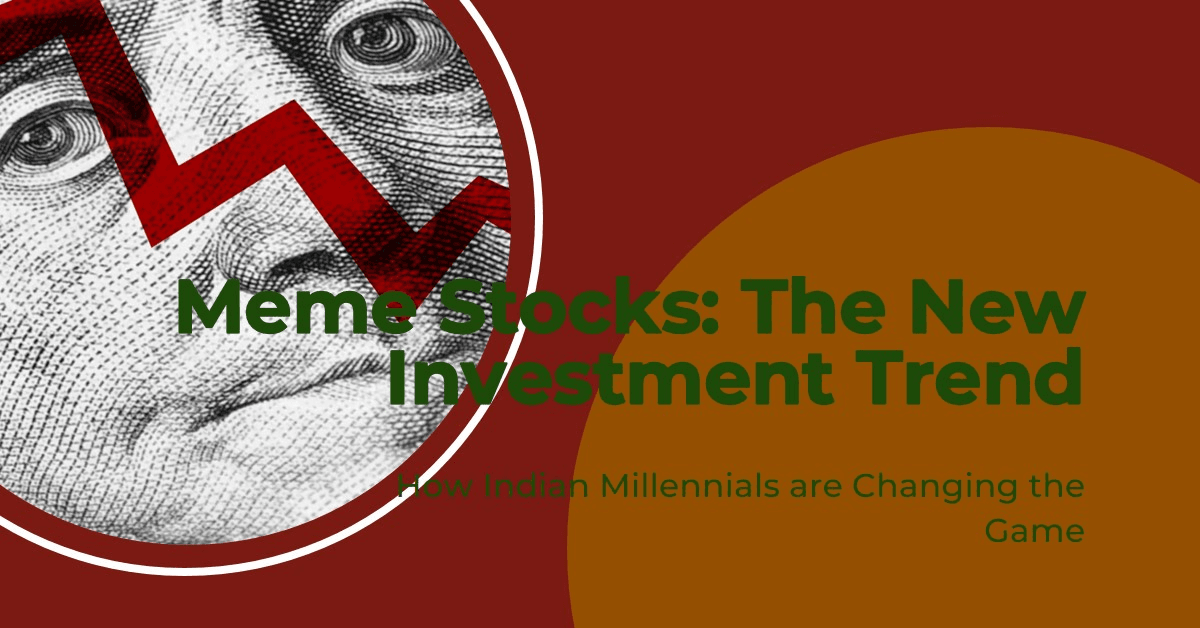In recent years, the phenomenon of meme stocks has dramatically impacted the global stock market, and India is no exception. What started as a viral trend in the U.S. with stocks like GameStop and AMC has now found its way to India, attracting a new generation of investors—Indian millennials. With platforms like Reddit, Twitter, and Discord playing a crucial role in shaping investment strategies, the rise of meme stocks has created a unique cultural shift in how young Indians view investing.
This article delves into how meme stocks and online investment communities are influencing Indian millennials, examining both the opportunities and the risks of this trend. We’ll also explore how the behavior of millennial investors differs from traditional investing and the broader implications for India’s financial markets.
What Are Meme Stocks?
Meme stocks are shares of companies that gain popularity primarily through social media and online forums, rather than through traditional financial analysis or fundamentals. These stocks are often characterized by:
- Viral discussions on platforms like Reddit’s r/WallStreetBets, where retail investors collectively decide to drive up stock prices.
- A focus on short-term gains driven by hype and speculation.
- A willingness to challenge institutional investors, particularly hedge funds, by coordinating buying efforts to inflate stock prices and force short squeezes.
In India, a similar dynamic has emerged, with millennial investors flocking to stocks that gain sudden popularity due to online communities or social media influencers. The idea of “meme stocks” resonates with young Indians who are eager to try unconventional methods of wealth creation.
The Appeal of Meme Stocks to Indian Millennials
1. Access to Information and Trading Apps
The rise of trading apps like Zerodha, Upstox, and Groww has democratized access to the stock market. Millennials can now trade from their smartphones, with low fees and intuitive interfaces. With these apps, investing has become much more accessible to young Indians who may not have had access to financial markets before.
Millennials are also more connected than ever, thanks to social media and online forums, where they can gather real-time information and advice on meme stocks. Communities on platforms like Reddit India and Twitter often discuss Indian companies that are trending, sharing analysis, predictions, and opinions, which helps drive stock prices up through coordinated buying.
2. Cultural Shift: Investing as Entertainment
Traditional investing has typically been viewed as a slow, steady process of building wealth over time. However, meme stock investing is often framed as a high-stakes game, more akin to gambling or entertainment. For Indian millennials, investing in meme stocks offers thrill and excitement, as they attempt to make quick profits.
This cultural shift in how millennials view the stock market is driven largely by the gamification of trading. Apps often reward users with instant notifications, achievements, and visually appealing charts, which adds to the excitement and makes investing feel more interactive. Moreover, online communities provide validation and social proof, making the experience feel communal.
3. Rebellion Against Traditional Finance
Another reason meme stocks appeal to Indian millennials is the anti-establishment sentiment embedded within the meme stock movement. In the U.S., meme stocks became a way for retail investors to challenge institutional investors, particularly hedge funds that engage in short-selling.
This sentiment resonates with Indian millennials who feel disillusioned with traditional financial institutions. Many young investors believe that the stock market has historically favored institutional players and wealthy individuals. By driving up the price of meme stocks, they see themselves as leveling the playing field and taking control of their financial future.
Risks Involved with Meme Stocks
While meme stocks present opportunities for quick gains, they also come with significant risks, especially for novice investors. Some of the key risks include:
1. Volatility
Meme stocks are known for their extreme volatility. Because their prices are driven more by social media hype than company fundamentals, they can rise and fall dramatically in short periods. For instance, a stock may skyrocket in value due to a viral post on Reddit, only to crash days later when the hype fades. Indian millennials who are drawn to these stocks must be prepared for the potential of significant losses.
2. Lack of Fundamental Analysis
Traditional stock market investing involves researching a company’s financials, growth prospects, and market position. Meme stock investing, on the other hand, often ignores these factors, focusing instead on social media buzz. This approach can be dangerous for millennials who may lack experience in financial analysis and rely solely on herd mentality.
In the long term, this lack of fundamental research can lead to poor investment decisions, as many meme stocks are overvalued and not supported by solid business models.
3. FOMO (Fear of Missing Out)
The social media-driven nature of meme stocks creates a sense of FOMO, where millennials may feel pressure to buy into a stock simply because it’s trending. This leads to rash decisions, where investors buy at inflated prices, only to lose money when the stock crashes. The psychological pressure to follow the crowd can result in emotional investing, which often leads to poor outcomes.
4. Regulatory Concerns
In the U.S., the GameStop and AMC phenomena drew the attention of regulators, who are concerned about the potential for market manipulation. In India, regulators like SEBI (Securities and Exchange Board of India) are also monitoring the impact of social media-driven stock movements. As the meme stock trend grows, Indian millennials may face greater scrutiny and potential regulations that limit the freedom to trade on hype alone.
How Indian Millennials are Changing Investing Trends
1. Rise of Retail Investors
The rise of meme stocks has contributed to an influx of retail investors in the Indian stock market. According to recent data, over 15 million new Demat accounts were opened in 2021 alone, with millennials accounting for a significant portion of these accounts. This shift represents a democratization of the stock market, with young investors eager to explore new opportunities.
Millennials are also turning to index funds, mutual funds, and cryptocurrencies, but meme stocks remain an essential part of this diversified portfolio. Platforms like Zerodha Varsity offer educational resources to help young investors learn about the risks and benefits of different investment strategies.
2. Influence of Social Media on Investment Decisions
Social media has transformed the way millennials in India make investment decisions. Unlike previous generations who relied on professional financial advisors or stock market reports, millennials are more likely to take cues from influencers, peers, and online communities.
Reddit threads, YouTube channels, and Instagram finance influencers now play a crucial role in shaping stock picks. However, this heavy reliance on social media comes with the risk of misinformation, as not all advice online is reliable or rooted in financial expertise.
3. The Future of Indian Stock Market Culture
The meme stock movement has fundamentally changed the culture of investing in India. Stock trading is no longer seen as the domain of seasoned investors or financial professionals. Instead, it has become a widespread hobby, with millennials actively participating in day trading and stock picking.
As more young people enter the market, we may see a continued emphasis on community-driven investing. While this cultural shift has opened up the stock market to a new generation of investors, it also raises concerns about long-term financial literacy and the need for better education on responsible investing.
Conclusion: A New Era of Investing in India
The rise of meme stocks has had a profound influence on Indian millennials and their approach to investing. With the democratization of stock market access, the power of social media, and a growing community of retail investors, young Indians are reshaping the investment landscape.
However, while meme stocks provide a thrilling opportunity for quick gains, they also come with substantial risks. As Indian millennials continue to explore the world of investing, it’s crucial for them to balance hype with sound financial strategies and education.
For more insights on how Indian stock market trends are evolving and tips for responsible investing, check out our related articles on Inflationary Pressures in India and Remote Work Trends.
External Links:
- SEBI Guidelines on Trading: Learn more about India’s stock market regulations.
- Zerodha Varsity: Explore educational resources for young investors looking to improve their stock market knowledge.
As the influence of meme stocks continues to grow, Indian millennials are at the forefront of a cultural shift in investing. Whether this trend will have long-lasting positive effects remains to be seen, but there’s no doubt that millennials are changing the way India invests.










